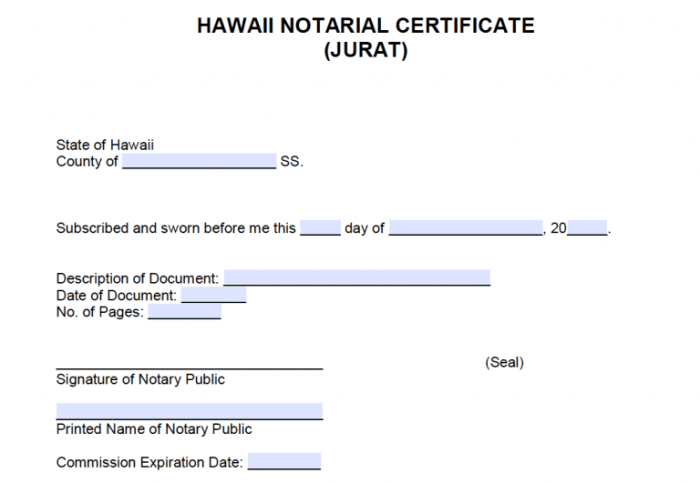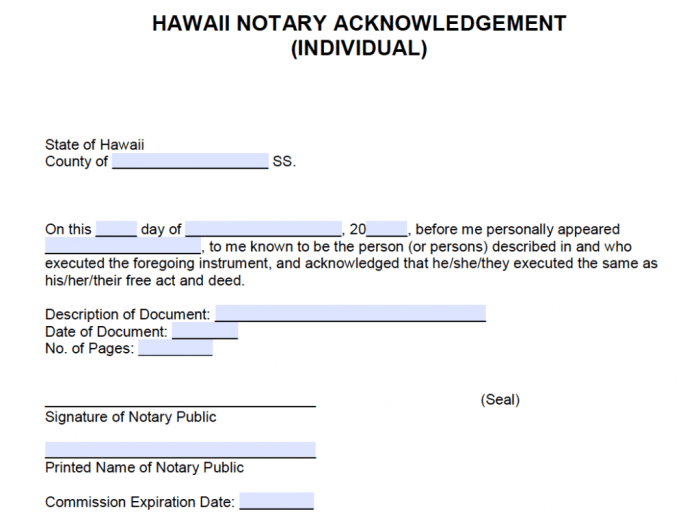State of hawaii notary public manual – The Hawaii Notary Public Manual serves as an indispensable resource for notaries public operating within the Aloha State. This comprehensive guide provides a thorough understanding of the legal framework, duties, and best practices associated with notarization in Hawaii.
Delving into the intricacies of Hawaii Notary Public Law and Regulations, the manual clarifies the requirements for becoming a notary public, Artikels their responsibilities, and highlights the fees they are authorized to charge. It also explores the emerging realm of electronic notarization, addressing the laws and regulations governing its implementation.
1. Hawaii Notary Public Law and Regulations

Notaries public in Hawaii are governed by a comprehensive legal framework that Artikels their duties, responsibilities, and qualifications.
The Hawaii Revised Statutes (HRS) Chapter 45-22 provides the legal basis for notaries public in the state. This chapter establishes the requirements for becoming a notary public, including residency, age, and background checks.
Qualifications for Becoming a Notary Public in Hawaii
- Must be at least 18 years old
- Must be a resident of Hawaii
- Must pass a background check
- Must complete a notary public education course
Duties and Responsibilities of Notaries Public in Hawaii
Notaries public in Hawaii have a variety of duties and responsibilities, including:
- Verifying the identity of individuals signing documents
- Administering oaths and affirmations
- Attesting to the execution of documents
- Maintaining accurate notary records
2. Notary Public Manual for Hawaii: State Of Hawaii Notary Public Manual
The Hawaii Notary Public Manual is a comprehensive guide that provides notaries public with detailed information about their duties and responsibilities.
The manual is published by the Office of the Lieutenant Governor and is available online.
Purpose and Content of the Hawaii Notary Public Manual, State of hawaii notary public manual
The purpose of the Hawaii Notary Public Manual is to provide notaries public with clear and concise guidance on how to perform their duties in accordance with the law.
The manual covers a wide range of topics, including:
- The qualifications for becoming a notary public
- The duties and responsibilities of notaries public
- The procedures for performing notarial acts
- The maintenance of notary records
Obtaining a Copy of the Hawaii Notary Public Manual
Notaries public in Hawaii can obtain a copy of the manual online or by contacting the Office of the Lieutenant Governor.
3. Best Practices for Hawaii Notaries Public
Notaries public in Hawaii should follow best practices to ensure that they are performing their duties in a professional and ethical manner.
Tips for Performing Notarial Acts
- Always verify the identity of the individual signing the document.
- Require the individual to sign the document in your presence.
- Complete the notarial certificate accurately and completely.
- Maintain accurate notary records.
Common Pitfalls to Avoid
- Not verifying the identity of the individual signing the document
- Allowing the individual to sign the document outside of your presence
- Not completing the notarial certificate accurately and completely
- Not maintaining accurate notary records
4. Hawaii Notary Public Fees

Notaries public in Hawaii are allowed to charge fees for their services.
The authorized fees are set by the Hawaii Revised Statutes (HRS) Chapter 45-22.
Authorized Fees for Notaries Public in Hawaii
| Service | Fee |
|---|---|
| Notarizing a signature | $5.00 |
| Administering an oath or affirmation | $5.00 |
| Taking an acknowledgment | $5.00 |
| Protesting a note or bill of exchange | $10.00 |
Notaries public are not allowed to charge more than the authorized fees.
5. Electronic Notarization in Hawaii

Electronic notarization is a method of notarizing documents electronically.
Electronic notarization is legal in Hawaii, but it is subject to certain requirements.
Requirements for Electronic Notarization in Hawaii
- The notary public must be commissioned in Hawaii.
- The notary public must use a secure electronic signature.
- The electronic notary system must meet certain security standards.
Benefits and Challenges of Electronic Notarization
Electronic notarization offers several benefits, including:
- Convenience
- Speed
- Cost-effectiveness
However, electronic notarization also presents some challenges, including:
- Security concerns
- Lack of personal interaction
- Potential for fraud
User Queries
What are the requirements to become a notary public in Hawaii?
To become a notary public in Hawaii, individuals must be at least 18 years of age, a resident of the state, and pass a background check.
What are the duties and responsibilities of a notary public in Hawaii?
Notaries public in Hawaii are responsible for verifying the identity of individuals signing documents, witnessing their signatures, and administering oaths or affirmations.
What are the authorized fees that notaries public in Hawaii can charge?
Notaries public in Hawaii are authorized to charge a fee of $10 per notarial act.